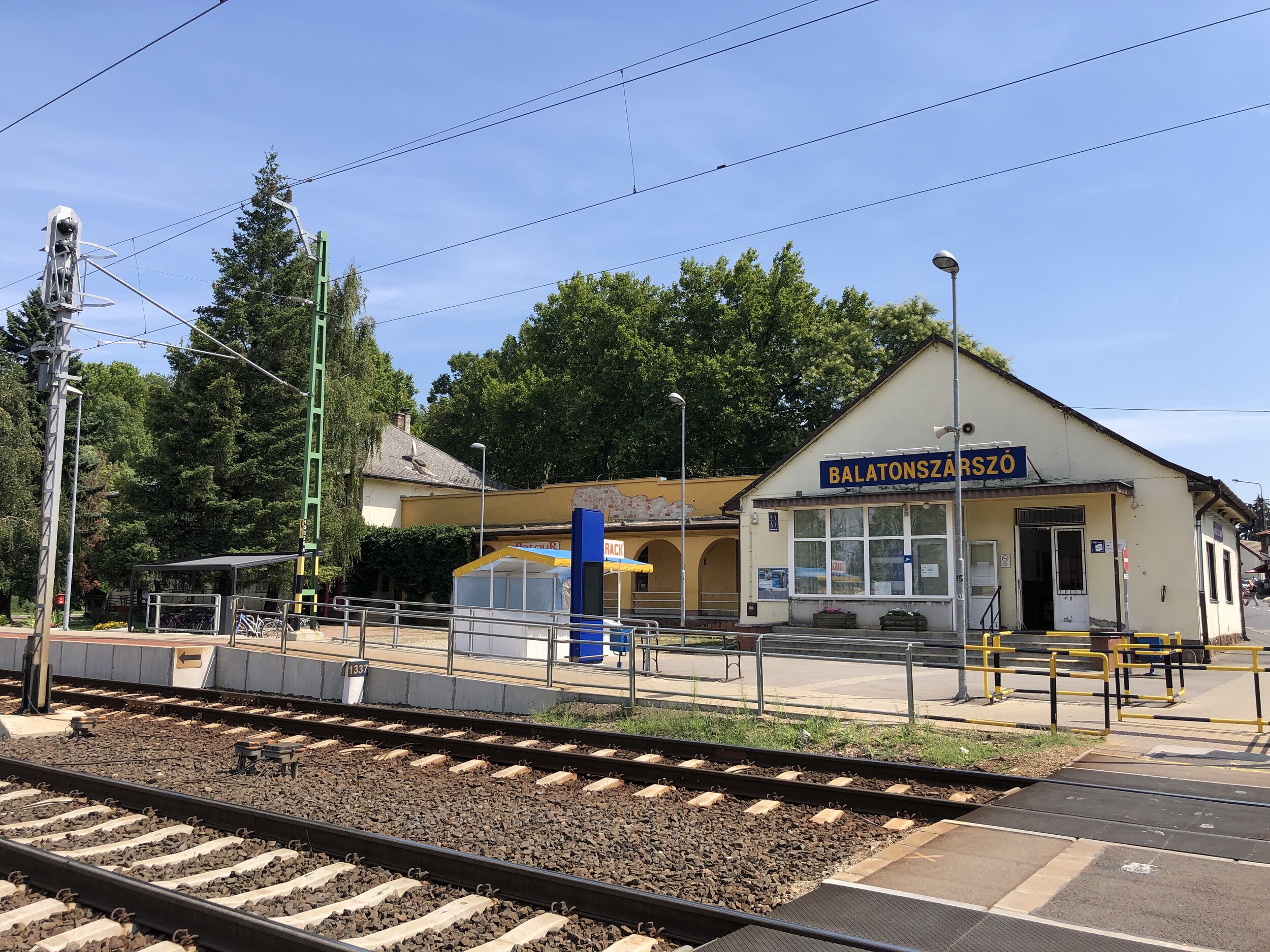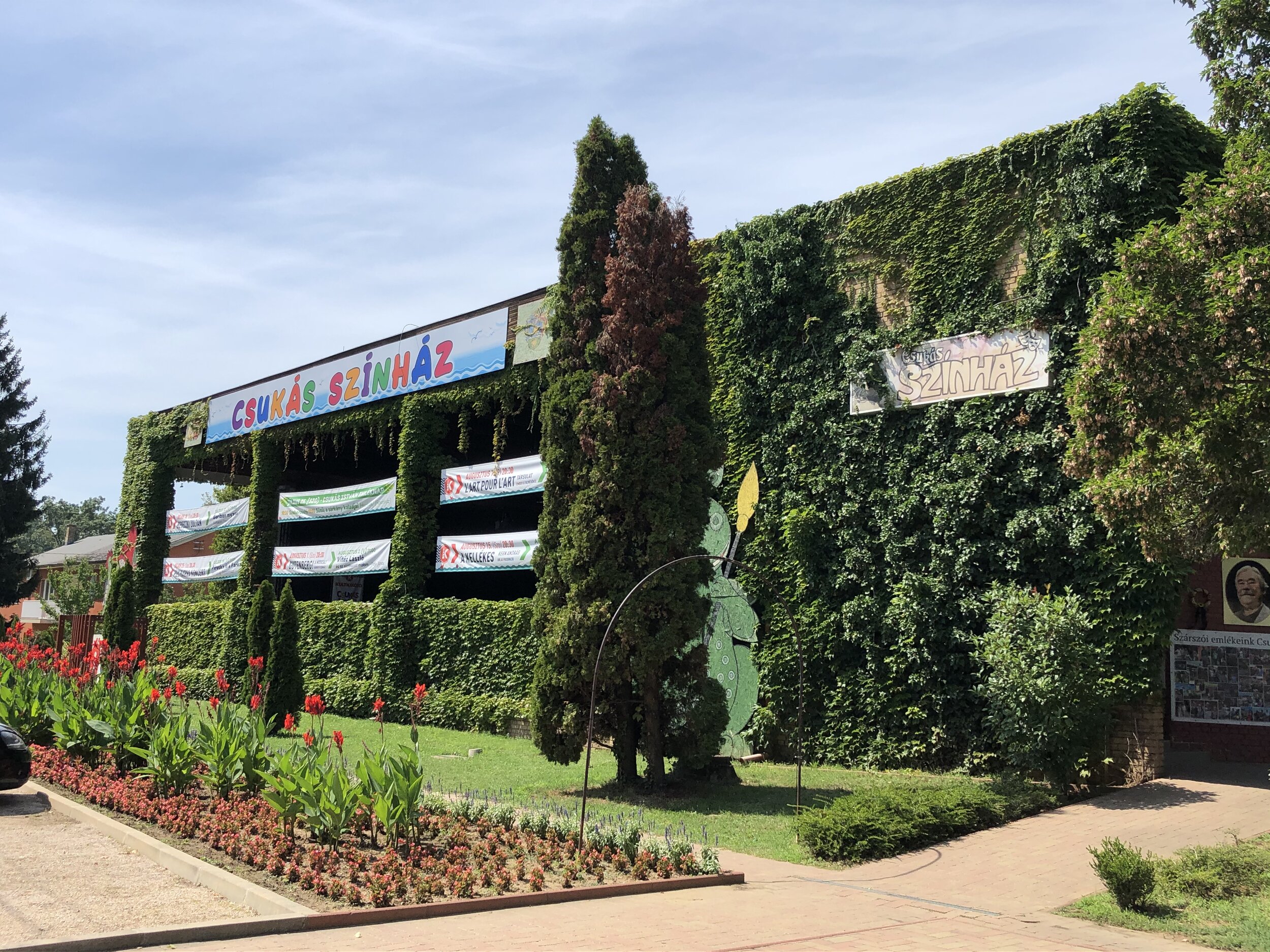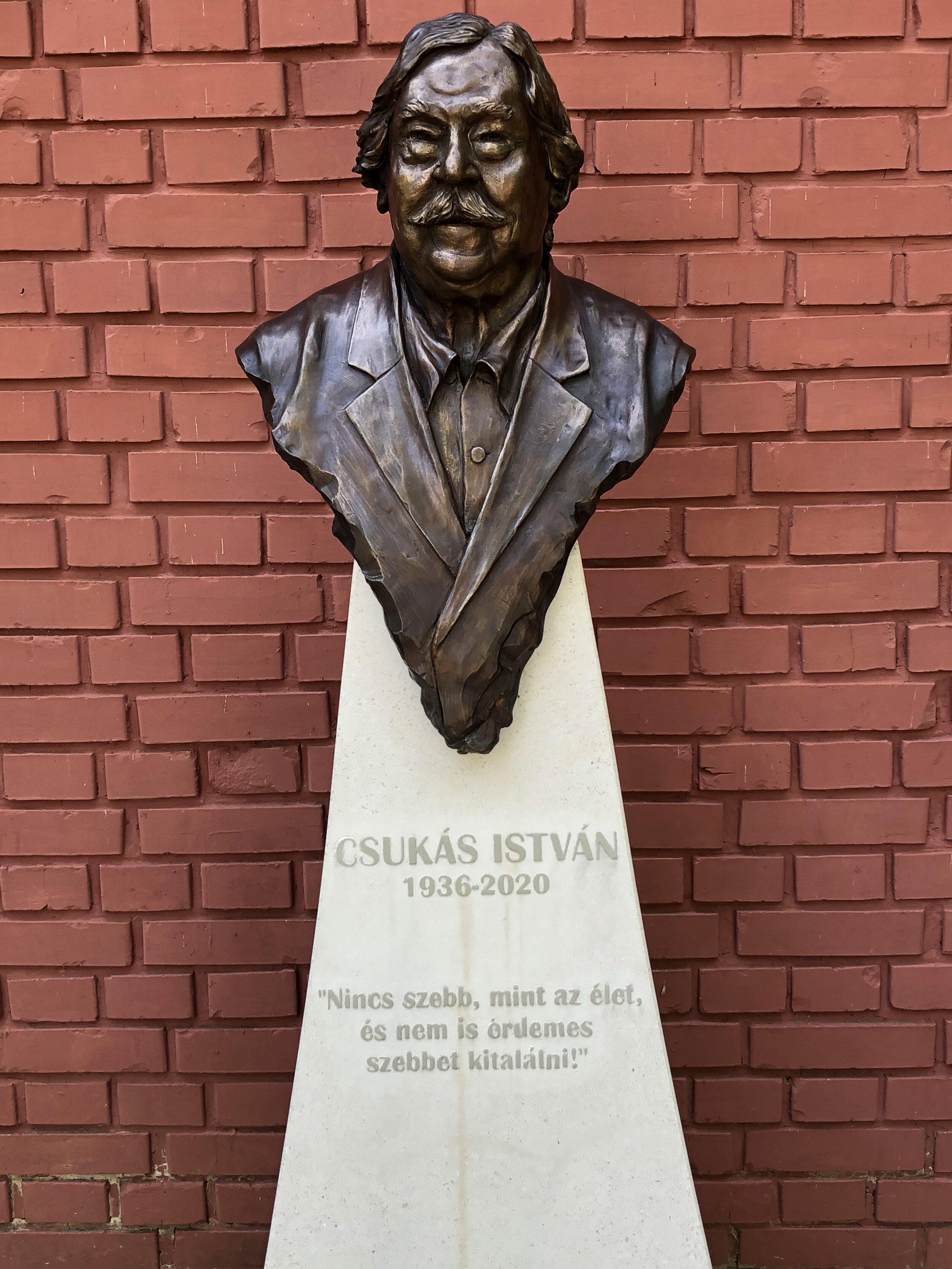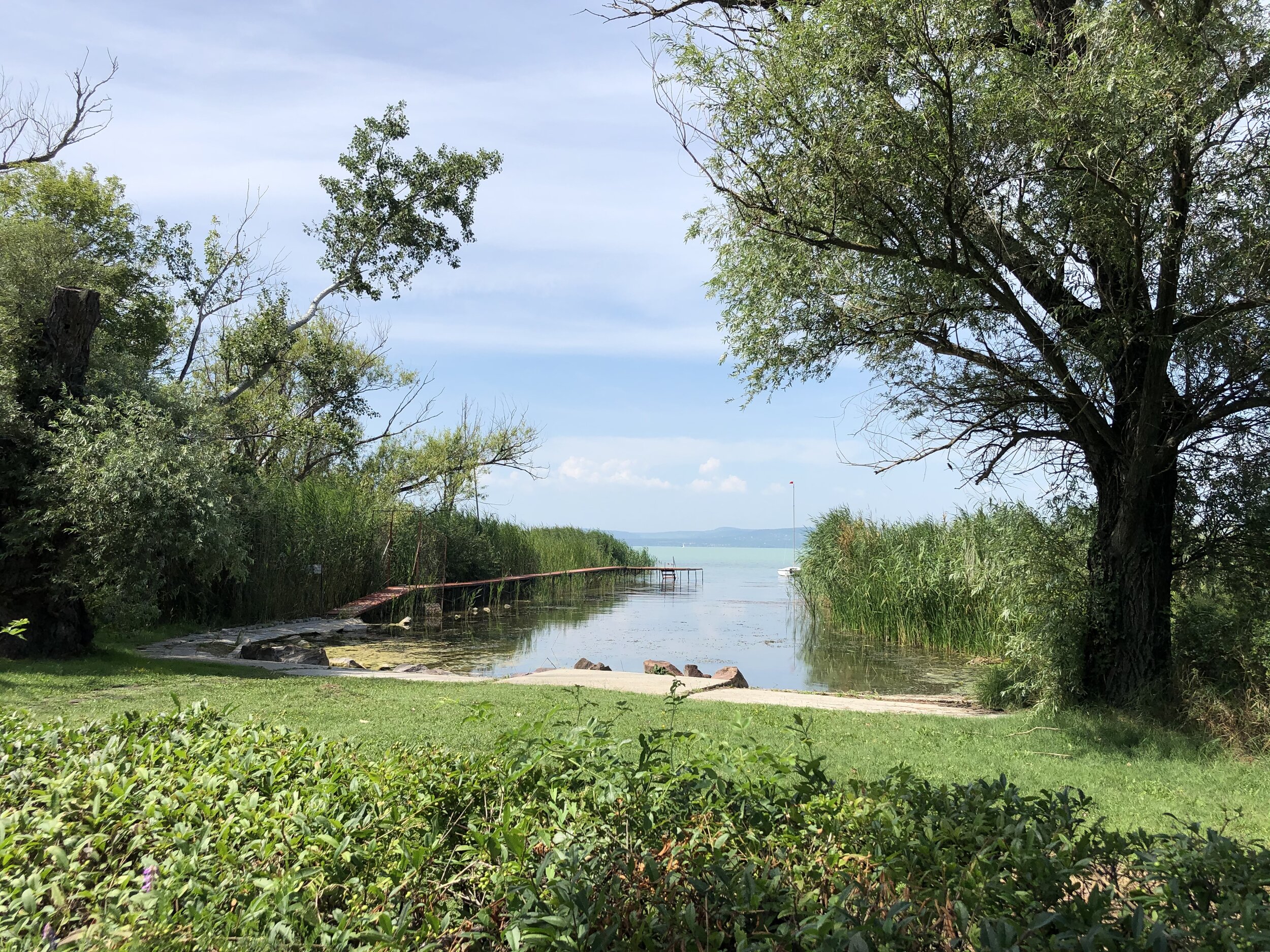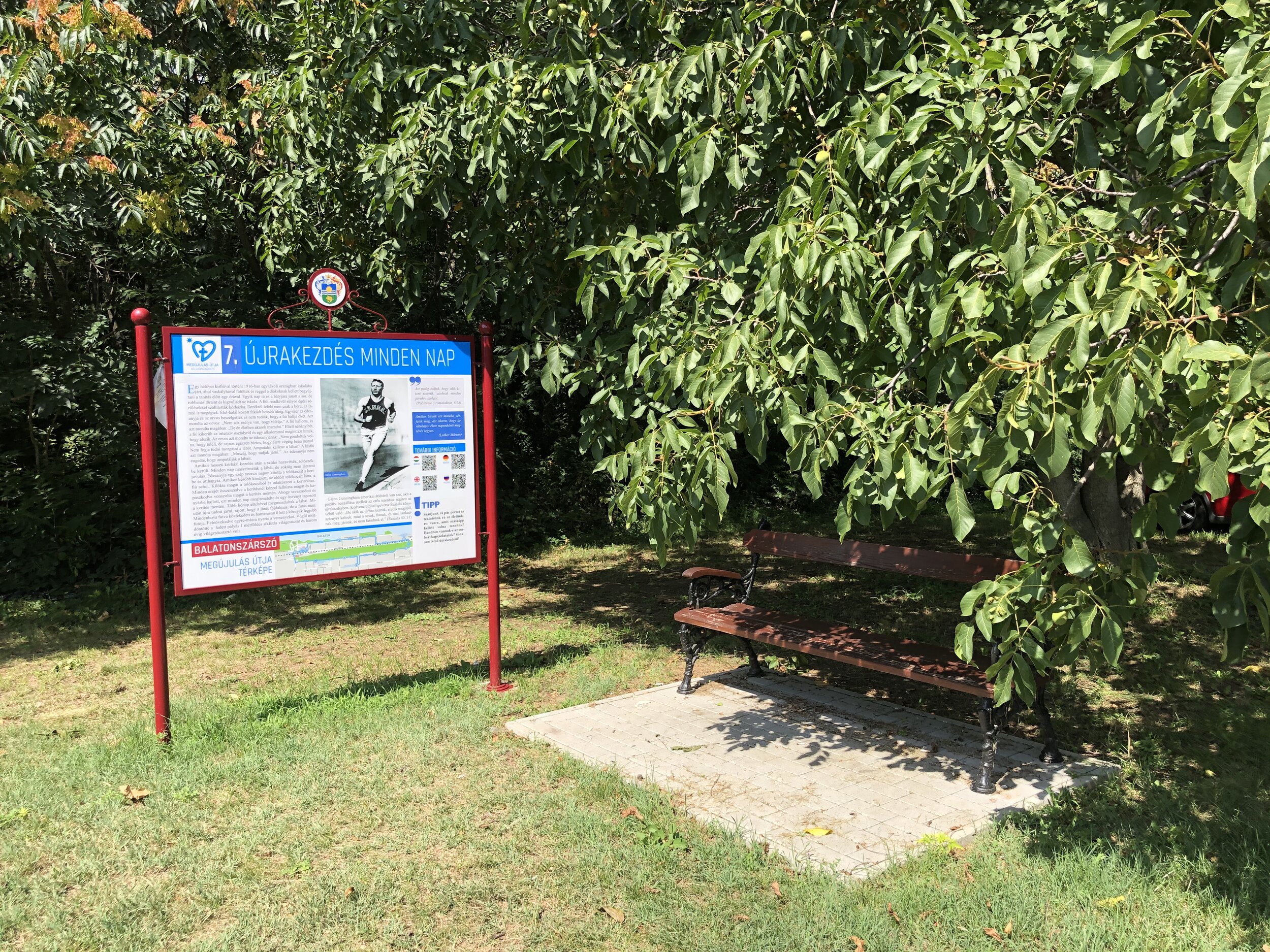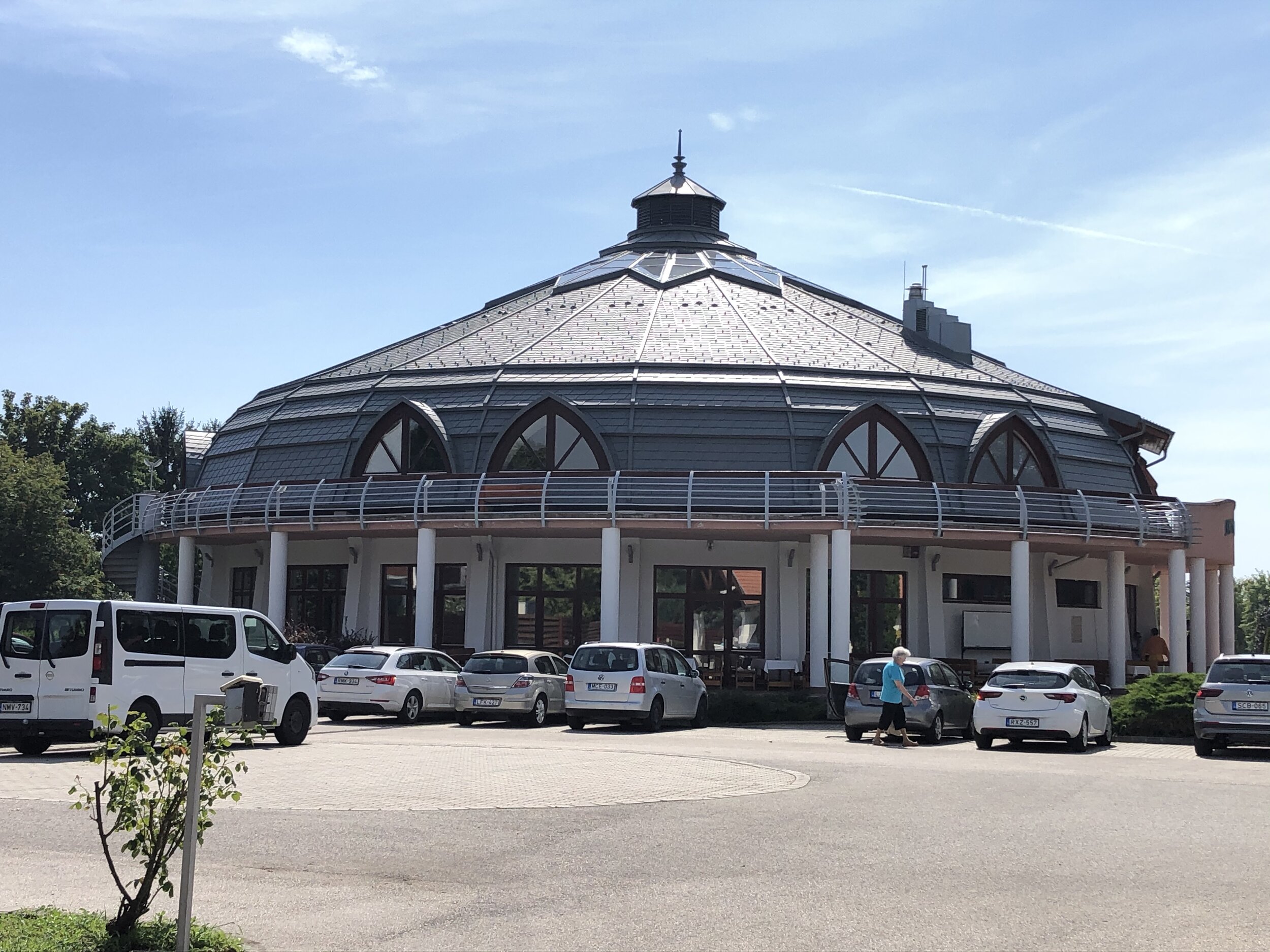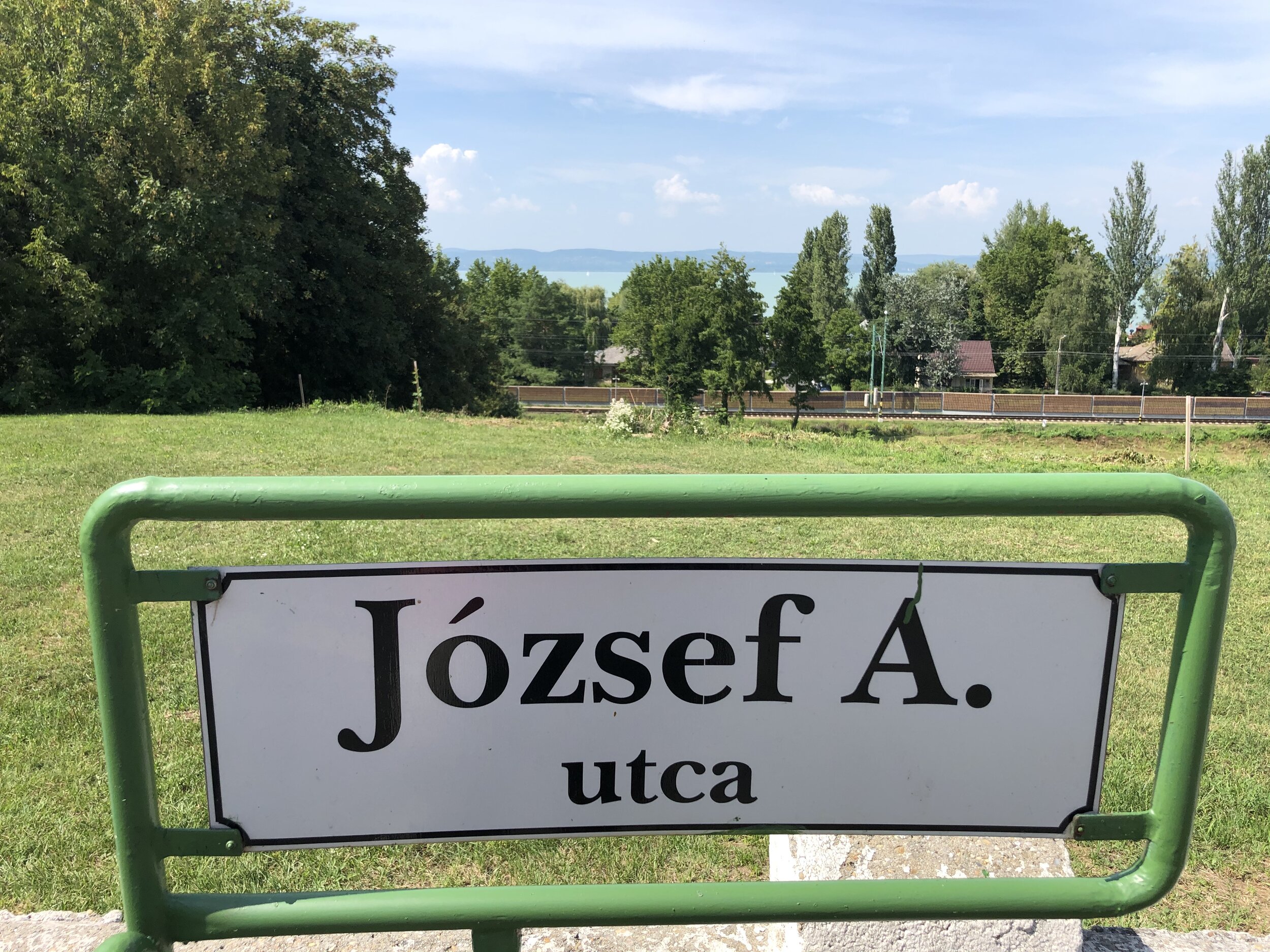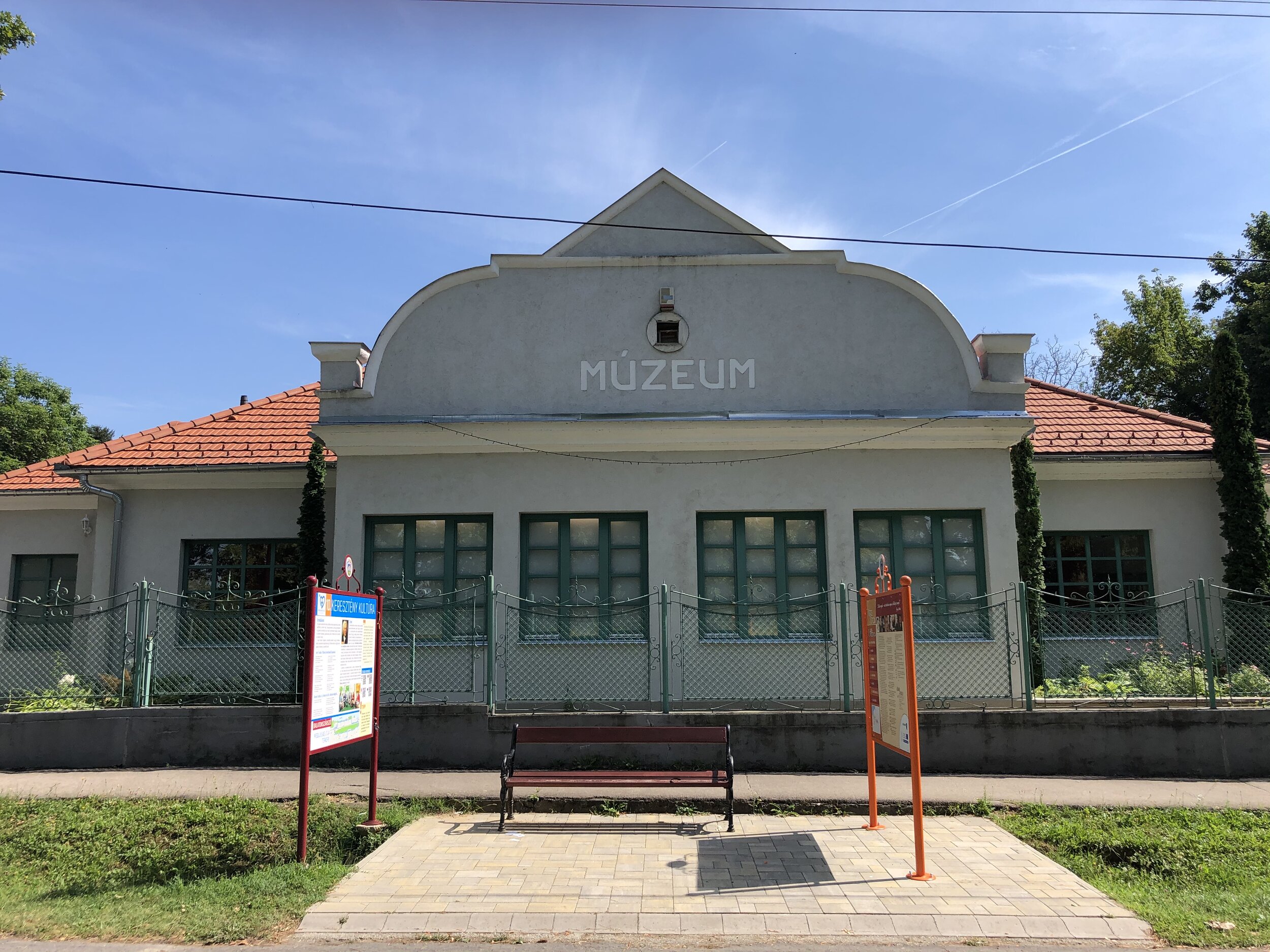Walking The Balatonszárszó Trail of Renewal, Hungary
Séta a BalatonszárszóI megújulás útján
Balatonszárszó is a small town on the south side of Lake Balaton in Hungary. It’s my wife’s original home town and her parents still live there so we visit every summer. As well as enjoying the lake there’s a lot of walks in the area. This is one of 2 very short sign-posted walks in the town.
The Way Of Renewal was established to mark the 500th anniversary of the Lutheran Reformation. Along the 3.5 km walk you pass by 10 large signs giving descriptions in Hungarian on reformation themes. Each sign has a QR code that takes you to a web-page with an English Translation. These links are also shown below, along with an extract of the first part of the English translation.
Start & Finish: Sign #1 on north-west side of Fő u. near railway crossing, Balatonszárszó
Distance: 3.5 km (2.2 miles)
Elevation change: +/- 19 m
GPX File: get via Buy Me a Coffee
Other routes touched (walk): Balatonszárszó Vers Utja (Poetry Trail)
Other routes touched (cycle): Balaton Cycle Route
Links: Way of Renewal, Lake Balaton, Balatonszárszó
Stop 1: The Way of Renewal
Location: North-west side of Fő u. near railway crossing.
Extract: The consequence of human life is being on the move. We always go somewhere. Many times we physically take action, sometimes we are only figuratively on the go in the walk of life. The road is sometimes smooth, but there are also bumpy sections. We may ride miles lonely, but again and again, travel companions join us for shorter and longer times. The goal of this journey is the road itself – this is the year-to-year opinion of the growing number of people who start the pilgrimage. And indeed, the experience of being on the road makes us mature, forms our bodies, souls, and spirits. We can get rid of unnecessary pounds when go out for a walk or a hike; get rid of heavy loads and packs that are painful to carry. We can abandon the unneeded, which hinders our fulfillment, which makes harmony impossible. Instead we may find ourselves refreshed, cleansed and relieved.
Full text at: https://www.megujulasutja.hu/1-en?language=en
Stop 2: Ecclesia semper reformanda
Location: Opposite main entrance to Csukás Színház on Szabolcs u.
From previous sign: Walk North-East on Jókai Mór u. turn left onto Szabolcs u.
Extract: Since members of the Church are imperfect, therefore the Church, unfortunately, is also imperfect. From time to time, the church leaves the path proper living, teaching, and everyday practice. The reformers raised their voices against this in the beginning of the 16th century when they realized that the Bible's guidance and church life were not in harmony with each other. The severe overtones of the church of that time prompted them to focus on the essence – on the One, which only matters in the Church: to God. This has been half a millennium ago, but we still feel its impact and actuality today.
Full text at: https://www.megujulasutja.hu/2-en?language=en
Stop 3: Scripture is available
Location: North side of Móricz Zsigmond u. before Harka u.
From previous sign: Continue north on Szabolcs u then right onto Móricz Zsigmond u
Extract: The first Christians took the mission of Jesus seriously: "Go then, and make disciples of all the nations, baptising them in the name of the Father and of the Son and of the Holy Spirit." The disciples spread the gospel of the resurrection of Jesus Christ to many people. The centuries have passed and the official ecclesiastical language became Latin. Until the middle of the XX. century, Latin was so widespread as English is today, and knowledge of Latin was part of basic education. Before the Reformation, the Bible was only available in Latin - for a few people, as ordinary people did not know Latin. The reformers realized 500 years ago that the ordinary people, the members of the Church did not understand the Latin mass, and they did not have access to the texts of the Scriptures and its explanation for their lives. Luther and his followers wanted to make the Bible accessible to everyone and they wanted to help people think for themselves, using their free will, and make decisions on their own. This was the greatest achievement of Reformation.
Full text at: https://www.megujulasutja.hu/3-en?language=en
Stop 4: Marriage, family
Location: Inside gate of Balatonszárszó szabadstrand, Móricz Zsigmond u
From previous sign: Continue east along Móricz Zsigmond u
Extract: When a man and a woman find each other and engage to each other, they get married. Starting from here, the married couple lives together. As the name 'married couple' indicates, it consists of two people who complement each other and form a couple. It is a divine vocation of man and woman to become a husband and wife, father and mother. They can realize this if they may count on each other and one can fulfill his/her own role with the kind support of the other one. Someone may only become a good wife by her husband's powerful support and vice versa: a good husband is formed by his wife's co-operation. Well-functioning marriage is a place of spiritual growth, and there is a perspective of spiritual enrichment and fulfillment, provided both parties do his/her own stuff for this purpose – and if they both renew from time to time.
Full text at: https://www.megujulasutja.hu/4-en?language=en
Stop 5: Community – responsibility
Location: North side of Jókai Mór u
From previous sign: Turn right onto Bulcsu u. at eastern end of Móricz Zsigmond u. Turn left onto Jókai Mór u. Continue north-east until Evangelikus Konferencia és Missziói Közpon.
Extract: Since the time of Jesus Christ, Christians are seeking the community with each other. Christianity is a community religion - God does not only need solitary heroes, but rather people willing to accept each other and to share their pleasures and concerns. Our relationship with each other Jesus taught Christians to love each other. This means that we seek the good in other people, since we were all made in the image of God. We accept the difficulties of life as God's trials, as he wants to educate and strengthen us with these. In the conflicts we are forgiving and peace-building, we abandon violence and retaliation. The Beatitudes „Happy are the poor in spirit: for the kingdom of heaven is theirs. Happy are those who are sad: for they will be comforted. Happy are the gentle: for the earth will be their heritage. Happy are those whose heart's desire is for righteousness: for they will have their desire. Happy are those who have mercy: for they will be given mercy. Happy are the clean in heart: for they will see God. Happy are the peacemakers: for they will be named sons of God. Happy are those who are attacked on account of righteousness: for the kingdom of heaven will be theirs. Happy are you when men give you a bad name, and are cruel to you, and say all evil things against you falsely, because of me.” (Gospel of Matthew 5:3-11)
Full text at: https://www.megujulasutja.hu/5-en?language=en
Stop 6: Creative knowledge
Location: North side of József Attila u.
From previous sign: Cross railway line on pedestrian crossing, follow path up hill through trees to József Attila u. Turn right.
Extract: It was one of the earliest achievements of Reformation to provide new intellectual possibilities for the everyday people of the Middle Ages.
Knowledge is power. It can be any kind of knowledge we have not already learned. To read and write, master crafts, learning languages or just reading the Scriptures.
It is necessary to learn to acquire knowledge, especially at an impressionable age, that is, in childhood and at a young age.
In the first years of the Reformation, pupils studying in in Germany and Switzerland from all over Europe, took the new doctrines into their home country. Universities of this time were the strongholds of renewal. They were soon followed by reforms in the lower schools. Elementary schools and grammar schools were mostly owned by the church. The ever-expanding network of Protestant schools provided the opportunity for more young people to have a high level of knowledge.
Full text at: https://www.megujulasutja.hu/6-en?language=en
Stop 7: Restart every day
Location: North side of József Attila u.
From previous sign: Continue south-west along József Attila u.
Extract: It happened with a seven-years-old boy in 1916 in a remote country: he went to school where they heated with a stove during winter. In the morning the students had to light the fire in the stove one hour before the lesson. One day he came with his brother to start the stove, but there was an explosion and the school started on fire. The boy was transported to the hospital with extremely severe burns. From the waist down, not only his skin but also his muscles were burned. He was between life and death for a long time. Once his mother and the doctor talked and they did not know that the boy was hearing them. The doctor said, "He doesn't have much chance to survive." The boy heard and said to himself, "But I want to stay alive." A few weeks later the boy left the intensive care unit and once again they believed that he was asleep. The doctor said to his mother: "We didn't believe he was going to survive, but unfortunately it is certain that he will remain lame till the end of his life. He won't be able to move his legs. They need to be amputated." The little boy said to himself, "I must walk!" Fortunately his mother did not let the doctor amputate his legs.
Full text at: https://www.megujulasutja.hu/7-en?language=en
Stop 8: Church Buildings
Location: Outside main gate of SDG Family Hotel and Conference Center, Csárda u. 41
From previous sign: Take a left footpath heading south-east and turn right onto Nárcisz u. Continue to SDG Family hotel on the junction of Nárcisz u. and Csárda u.
Extract: The church building is the place to meet God. It is important for the community and for the individual because there is a soul in it. It was built humbly, with active engagement and sweat. Regardless of whether it is a centuries-old building or a new modern temple. "The greatest beauty of a church building is that it belongs to God. It is His house. The House of Glory. The Holy Spirit's workshop. The interior beauty of the temple lies in the fact that it becomes the property of man. There is happiness, but also a commitment to say "my church". We feel that it is not a legal but a spiritual possession. The temple becomes mine only by constant use. The beauty of the temple shines to me when I can happily say "all my life ..." In youth and in old age, in dreams, in bitter awakening, in effective work, in humiliation and under the cross, I must always live in the Lord's temple. Only in this case can I say: my church. " (Béla Kapi, Lutheran bishop)
Full text at: https://www.megujulasutja.hu/8-en?language=en
Stop 9: Human and nature
Location: North side of József Attila u.
From previous sign: Continue north along Csárda u. and take a left onto József Attila u.
Extract: We believe the whole world is God's creation: humans and animals, land and plants, Milky Way and the stars. When God created the world, God entrusted man: „And the Lord God took the man, and put him into the garden of Eden to till it and to keep it"- we read this in the beginning of the Bible, in the book of Genesis, in the second chapter. According to this command, man is to care the world while utilizing natural resources for his benefit. Divine guidance for cultivation and guardianship means that we must treat nature as a careful host. We should not view nature as something to be exploited, but rather we should view it like a wise and forward-looking gardener who preserves natural treasures for future generations as well. Every day we experience that we cannot keep God's command. We all see the adverse effects of global warming, the negative weather changes and urban smog. There is a steady lack of water in the growing part of our planet, many species are extinct. The amount of exploitable minerals and fuels decreases, as well as carbon dioxide, emitted into the atmosphere, increases. This makes our planet less and less usable. There is an urgent need for global action to reduce environmental damage and stop destruction.
Full text at: https://www.megujulasutja.hu/9-en?language=en
Stop 10: Christian culture
Location: On József Attila u. outside József Attila Museum
From previous sign: Continue south-west along József Attila u.
Extract: The truly outstanding writers and poets have always been touched by the supernatural, the divine world. They sought answers to the tough questions of life and frequently called God as recipient with their poems. In the poetic form of human feelings and thoughts, divine poems were born.
In today's fast-pace world, it is a soul-stirring event, if we have a book of poems in our hands for even half an hour and let ourselves be filled up by their message.
Full text at: https://www.megujulasutja.hu/10-en?language=en
To complete the circuit and return to Sign #1 continue south-west along József Attila u, take a right onto Fő u. and cross the railway line.

